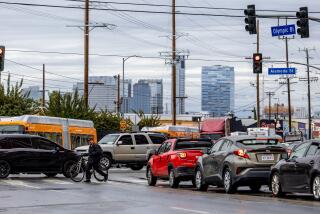Chicago Tunnel Leak Stopped but Rush-Hour Route Is at Risk
- Share via
CHICAGO — Work crews Sunday sealed off the underground tunnel breach that led to massive flooding in downtown Chicago last week, even as water from the flood posed a new threat to one of the city’s major commuter arteries during this morning’s rush hour.
Millions of gallons of water have been flowing into an underground freight tunnel system through a hole underneath the Chicago River, flooding building basements. But workers completed efforts Sunday to build underground concrete bulkheads on both sides of the river. The bulkheads are designed to block water from flowing into the rest of the tunnel system.
Mayor Richard M. Daley said the city appears “to have passed the first major technical hurdle” of the cleanup operation and can turn its attention to draining basements of about 250 million gallons of water.
“The tunnel appears to have been plugged on both sides of the leak,” said Daley, who appeared more relaxed Sunday than at previous points during Chicago’s weeklong water crisis.
But the crisis is far from over. It could still take about two weeks for the Army Corps of Engineers to pump out all the water in basements, officials said. Moreover, transportation officials were nervously bracing for a rush-hour mess this morning because of water damage under the Kennedy Expressway as it heads into downtown Chicago.
The problem is a huge drainpipe beneath a portion of the expressway that is in danger of collapsing because of pressure from water seeping in from one of the flooded freight tunnels nearby. If the drainpipe collapses, the north-south expressway would be inundated with water at a 2,000-foot-long underpass, authorities said. On Saturday, authorities shut down two of the five lanes that go through the underpass in each direction and said they are prepared to close the expressway at the first sign of flooding.
Crews cannot go in and fix the drainpipe until water is drained from the tunnel system. The Corps of Engineers said crews had planned to begin pumping water out of the system Sunday night or today, but cautioned that the process must proceed slowly because officials do not want to cause any further structural damage to Chicago’s downtown office buildings.
More to Read
Sign up for Essential California
The most important California stories and recommendations in your inbox every morning.
You may occasionally receive promotional content from the Los Angeles Times.













